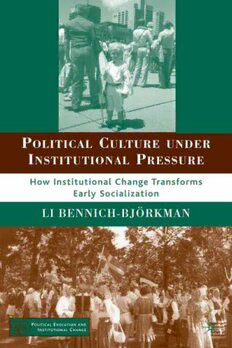
Political Culture under Institutional Pressure: How Institutional Change Transforms Early Socialization (Political Evolution and Institutional Change) PDF
204 Pages·2007·1.225 MB·English
Most books are stored in the elastic cloud where traffic is expensive. For this reason, we have a limit on daily download.
Preview Political Culture under Institutional Pressure: How Institutional Change Transforms Early Socialization (Political Evolution and Institutional Change)
Description:
Are world views once formed during childhood and adolescence stable over life or do they change when they come under pressure from new institutional contexts? This book seeks the answer by re-visiting an aged political generation growing up in historically unique interwar Estonia but living their adult lives in exile in Canada and Sweden or under foreign occupation in the then-Soviet Estonia. Some major conclusions drawn are that of dominant "cultural themes" being stable over time in all three groups, while cultural correspondence between country of origin and host society plays an essential role in explaining why the exile communities differ in their degree of genuine democratic citizenship.
See more
The list of books you might like
Most books are stored in the elastic cloud where traffic is expensive. For this reason, we have a limit on daily download.
